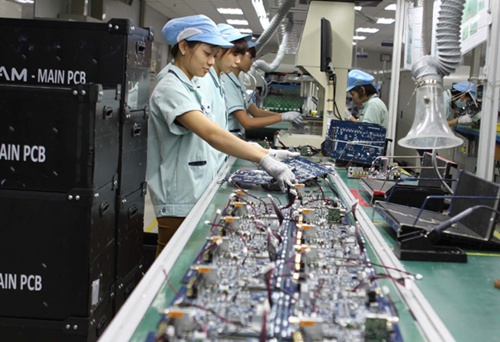Vietnamese economy on the rise according to S&P report
 |
| Goods are assembled at the Electronics Viet Nam Co in Ha Nam Province's Dong Van 2 Industrial Zone. - VNA/VNS Photo Danh Lam |
According to S&P, four years ago, the Vietnamese economy was struggling with non-performing loans as the Government focused on feeding credit to its State-owned enterprises.
However, since then, the country has attracted sufficient foreign direct investment (FDI) to drive strong export growth despite sluggish demand and falling global prices.
Electronics exports have been growing at almost 33 per cent per year for three years, making up 18-29 per cent of the total exports. Meanwhile, garments and textiles have stayed at some 20 per cent of all exports.
Overall, the FDI doubled from 2012 to 2014, compared with the previous three years. Japan and the Republic of Korea each contributed some 22 per cent; Singapore, 16 per cent; mainland China and Hong Kong, 13 per cent.
Australia's own trade with Viet Nam soared 35 per cent in 2014 to A$8 billion (US$5.7 billion).
The size of the workforce in Viet Nam, which has a population of 91 million, is an important element, S&P said, attributing the productivity to the provision of new cutting-edge equipment.
The World Bank estimated that Viet Nam's working-age population will keep growing into 2030, whereas China's is starting to decline.
According to the Singapore-based business analysis agency IMA Asia, Viet Nam is set to gain more from the Trans-Pacific Partnership (TPP) agreement than any of the other 11 members through lower import tariffs on its branded exports.
Viet Nam is likely to grow 6.2 per cent and 6.4 per cent in 2015 and 2016, respectively, IMA Asia said.
What the stars mean:
★ Poor ★ ★ Promising ★★★ Good ★★★★ Very good ★★★★★ Exceptional
Latest News
More News
- Vietnamese businesses diversify amid global trade shifts (February 03, 2026 | 17:18)
- Consumer finance sector posts sharp profit growth (February 03, 2026 | 13:05)
- Vietnam and US to launch sixth trade negotiation round (January 30, 2026 | 15:19)
- NAB Innovation Centre underscores Vietnam’s appeal for tech investment (January 30, 2026 | 11:16)
- Vietnam moves towards market-based fuel management with E10 rollout (January 30, 2026 | 11:10)
- Vietnam startup funding enters a period of capital reset (January 30, 2026 | 11:06)
- Vietnam strengthens public debt management with World Bank and IMF (January 30, 2026 | 11:00)
- PM inspects APEC 2027 project progress in An Giang province (January 29, 2026 | 09:00)
- Vietnam among the world’s top 15 trading nations (January 28, 2026 | 17:12)
- Vietnam accelerates preparations for arbitration centre linked to new financial hub (January 28, 2026 | 17:09)
















 Mobile Version
Mobile Version